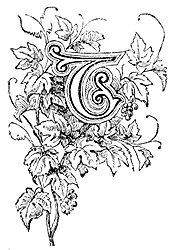 |

HE park of Draycot, richly studded with ancient oaks, crowns a hill commanding a charming prospect, and is esteemed one of the most beautiful spots in Wiltshire. The Manor House is a large irregular building, with this fine park and pleasure grounds attached to it. It contains many objects of interest; paintings, Sevres china, curious fire-dogs, and candelabra presented to the family by Charles II. after his restoration.
The old place took its name from the Draycot-Cernes family, to whom it belonged in the thirteenth century. From them it passed by marriage to the family of Wayte; and in the reign of Henry VII., Sir Thomas Long, of Wraxall, became proprietor in right of his mother, Margaret, heiress of the Wayte family. He married a daughter of Sir George Darell, of Littlecote, by whom he had three sons.
The great grandson of Sir Thomas Long was named Walter. It is to his family that the singular and touching legend of the white hand belongs.
He married; had a son; and lost his wife. Till his son was grown up, Sir Walter continued a widower; but then he married (though of mature years) a young lady - Catherine, daughter of Sir John Thynne, of Longleat.
When he brought his bride home, there were great rejoicings in the village. Revelry - such as was usual in that age - prevailed.
There was but one who walked sadly amongst the rural guests, though generally he was fond of pleasure, and he was the heir of Draycot and Wraxall, who saw his mother's place taken by a mere girl.
Warm-hearted and generous, John Long was simple, candid, and unsuspicious. It never occurred to him that in the girl-bride and her brother, Sir Egremont, he had two subtile enemies.
They became very friendly with him, and studied his character closely. They found that he loved gaiety, liked play, and (though not a drunkard) had no objection to a cheerful glass; but hitherto his father's parsimony had checked his inclinations, for Sir Walter was a miserly as well as a grave and unrelenting man. John's young stepmother showered gold upon him, and bade him enjoy his youth; she and her brother merely smiled when, by-and-by, they heard of his excesses; but they carried an exaggerated report of his conduct to his stern father, who listened with perfect faith to all his charming wife told him.
Sir Walter's health was failing, and he began to think of making his will. He deemed it a sin to leave anything to one who would, as he believed, spend all on drinking and gambling; therefore he told his wife that he meant to disinherit his eldest son, and leave his entire property to her, to her child, and her brother. Sir Egremont, greatly pleased, hastened to draw up a draft will, and set it before the old knight for his approval. Assent to it was readily given, and he desired Egremont to have it engrossed.
Now comes the supernatural part of this strange story. Engrossing requires a clear, bright light. Any shadow intervening between the light and the parchment is sure to interrupt the work. As the clerk about midnight was engrossing Sir Walter's will, a shadow came between it and the light. Ho looked up to see what it was, and beheld a small, beautiful white hand held between the lamp and the spot of the vellum on which he was engaged. He was greatly startled; but almost instantly it disappeared; and believing that his senses had deceived him, the young man resumed his task. He had just begun the cruel sentence in which Sir Walter declared that he disinherited his son John, on account of his immoral and disgraceful conduct, when once more the shadow came between him and the lamp. Again he looked up, and there was the white hand interposing once more. The clerk was seized with sudden fear and awe; he sprang up, went to Sir Egremont's chamber, and roused him from his sleep, to tell him of the singular vision. "It was the hand of the dead mother," he continued excitedly, "come from the grave to defend her son. I will not en. gross that wicked will."
Sir Egremont was very angry, and treated the story with contempt; but the young scribe was firm in his refusal to engross it. The deed was, however, engrossed by another clerk, and was duly signed and sealed Sir Walter dying soon after, his great fortune passed to the cunning step. mother and her boy.
Yet the appearance of the white hand was not without results. The clerk's strange story got abroad, and became the subject of general conversation.
A number of friends rose up to aid the disinherited heir, who, but for the interest roused by the clerk's story, might have forgotten him. The trustees of the first Lady Long arrested the old knight's corpse at the church door; her nearest relatives commenced a suit against the widow, and the result was a compromise between the parties, by which John Long was to have possession of Wraxhall, while his stepmother and half-brother had Draycot.
The descendants of John Long are all extinct in the male line. His half-brother, Walter Long, was knighted, and represented Wiltshire in Parliament. His male representatives are also extinct.
The last of the family, a lady, married the Honourable William Wellesley Pole. Her fortune is said to have been £80,000 a year.
|
 |